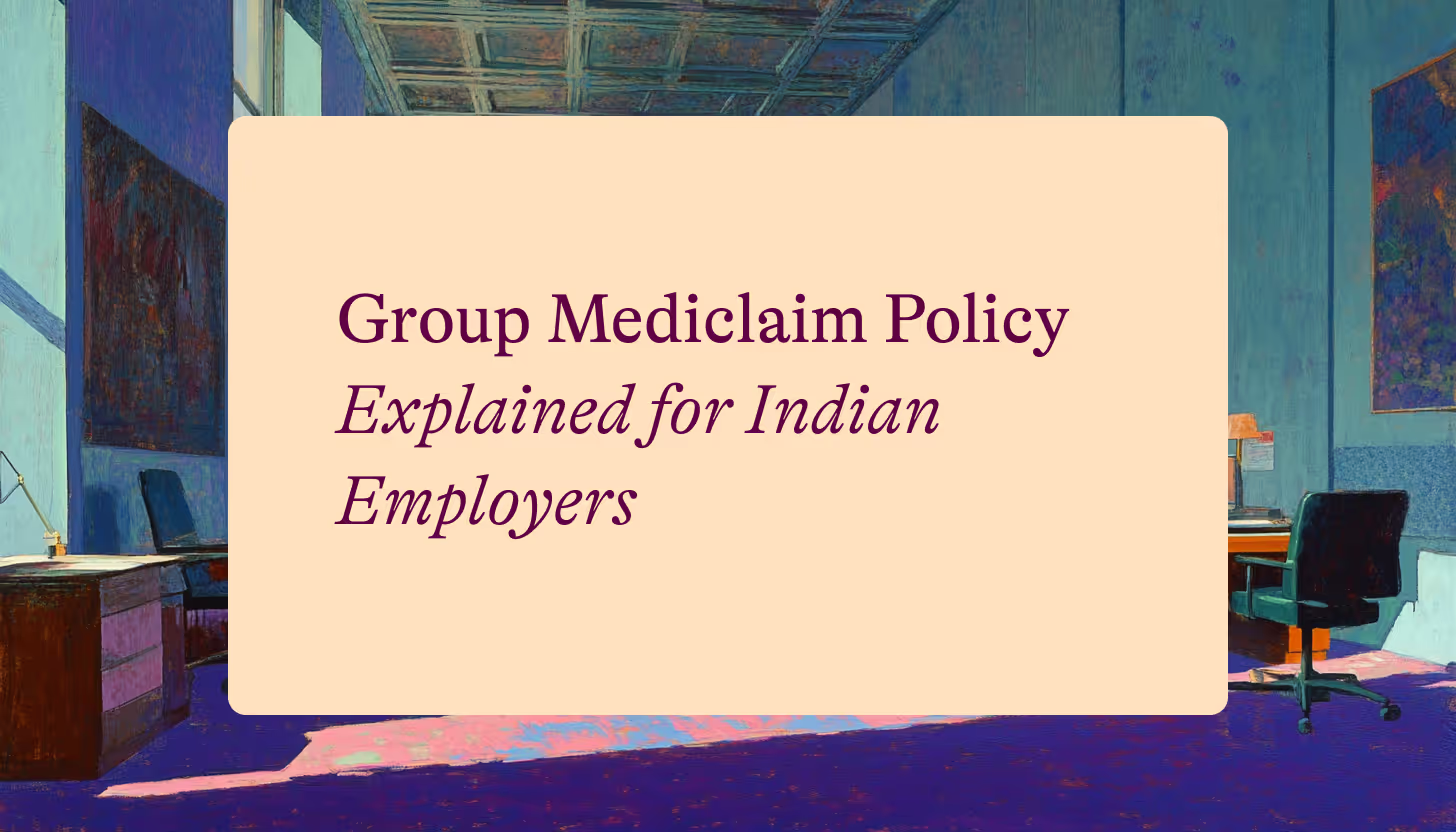Definition and Overview
A reimbursement claim in group health insurance refers to the process where an insured individual pays for medical expenses out of pocket and subsequently seeks reimbursement from their insurance provider. This method contrasts with cashless claims, where the insurer directly settles the bill with the hospital. Reimbursement claims are essential when treatment is availed at non-network hospitals or when cashless facilities are not available.
Group health insurance policies typically cover a wide range of medical expenses, including hospitalisation costs, pre- and post-hospitalisation expenses, and even day-care treatments. Understanding how to efficiently file a reimbursement claim can help employees minimise out-of-pocket expenses and ensure they fully utilise their insurance benefits.
Importance of Reimbursement Claims in Group Health Insurance
Reimbursement claims play a crucial role in group health insurance for several reasons:
- Flexibility: Employees can choose any hospital for their treatment, even if it is not part of the insurer's network.
- Access to Specialised Care: In cases where specialised treatment is required and only available at non-network hospitals, reimbursement claims become essential.
- Coverage Assurance: Ensures that employees are not financially burdened when immediate medical attention is required at non-network hospitals.
- Comprehensive Coverage: Encourages employees to seek necessary treatments without worrying about the network limitations.
Understanding and managing reimbursement claims effectively ensures that employees receive the full benefits of their group health insurance, providing peace of mind and financial stability during medical emergencies.
{{group-insurance-quote="/web-library/components"}}
Types of Claims in Group Insurance Policies
Group insurance policies typically offer two main types of claims:
-
Cashless Claims:
- Available at network hospitals.
- The insurer directly settles the bill with the hospital.
- Requires pre-authorisation from the insurance company.
-
Reimbursement Claims:
- Applicable when treatment is availed at non-network hospitals.
- The insured pays out of pocket and claims reimbursement later.
- Involves submitting relevant documents and bills to the insurer.
Each type has its own set of procedures and benefits, and employees should be aware of both to make informed decisions during medical emergencies.
Distinction Between Cashless and Reimbursement Claims
Understanding the differences between cashless and reimbursement claims is essential for effectively utilising group health insurance benefits.
-
Cashless Claims:
- No out-of-pocket payment at the time of treatment.
- Requires hospitalisation at a network hospital.
- Involves pre-authorisation from the insurance provider.
- Simplifies the process by eliminating the need to pay large sums upfront.
-
Reimbursement Claims:
- Out-of-pocket payment required initially.
- Applicable at non-network hospitals.
- Detailed documentation and claim submission needed post-treatment.
- Offers flexibility in choosing hospitals, ensuring access to preferred or specialised care.
Both options are designed to support employees during medical needs, and understanding when and how to use each can maximise the benefits of group health insurance.
Step-by-Step Guide to Filing a Reimbursement Claim
Filing a reimbursement claim can seem daunting, but breaking it down into manageable steps can simplify the process. Here's a detailed guide:
Initial Notification to the Insurance Company
- Immediate Notification: Inform the insurance provider as soon as possible after hospitalisation. Most insurers require notification within a specific period, typically 24 to 48 hours.
- Policy Details: Provide details of the policy, the insured person, and the treatment being sought.
- Receive Guidelines: Obtain the list of required documents and guidelines for the claim process from the insurer.
Documenting Expenses and Collecting Necessary Paperwork
- Maintain Records: Keep detailed records of all medical expenses incurred, including bills and receipts.
- Organise Documents: Collect and organise all necessary paperwork for submission.
Detailed List of Documents Required
To ensure a smooth and successful reimbursement claim, the following documents are typically required:
- Claim Form: Fully completed and signed.
- Medical Bills: Original hospital bills with itemised expenses.
- Prescription Receipts: All prescriptions and receipts for medicines purchased.
- Doctor's Certificate: A detailed certificate from the attending doctor explaining the diagnosis and treatment.
- Hospital Discharge Summary: The discharge summary provided by the hospital outlining the treatment received.
Collecting and submitting these documents promptly can expedite the reimbursement process and avoid unnecessary delays.
{{group-insurance-quote="/web-library/components"}}
Understanding the Reimbursement Claim Process
Navigating the reimbursement claim process requires careful attention to detail and timely submission of documents. Here's a step-by-step overview to help ensure a smooth experience:
Submission of Claim Form and Supporting Documents
- Complete Claim Form: Fill out the claim form accurately, providing all required details.
- Attach Supporting Documents: Include all necessary paperwork such as medical bills, prescription receipts, doctor's certificate, and hospital discharge summary.
- Submit to Insurer: Send the completed claim form and supporting documents to the insurance company's claims department, either online or through post, as per their guidelines.
- Retain Copies: Keep copies of all documents submitted for your records.
Process of Verification and Inquiry by Insurance Company
- Initial Review: The insurance company will conduct an initial review of the submitted claim to ensure all required documents are included.
- Verification: The insurer may verify the authenticity of the documents and the details provided. This could involve contacting the hospital or the treating doctor.
- Additional Information: If any additional information or documents are needed, the insurer will reach out to you. Respond promptly to avoid delays.
- Claim Approval or Rejection: Once verification is complete, the insurer will either approve or reject the claim based on their assessment.
How to Track Your Claim Status
- Online Tracking: Most insurance companies offer online portals or mobile apps where you can track the status of your claim.
- Customer Support: You can also contact the insurance company's customer support team for updates on your claim.
- Notifications: Insurers often send updates via email or SMS, keeping you informed of your claim's progress.
Staying proactive and following up regularly can help ensure your claim is processed efficiently.
Common Pitfalls and How to Avoid Claim Rejection
Avoiding common mistakes can significantly increase the chances of your claim being approved. Here are some tips:
- Adhere to Timelines: Ensure you notify the insurer within the stipulated time frame and submit all documents promptly.
- Provide Complete Information: Incomplete or incorrect information can lead to delays or rejection. Double-check all details before submission.
- Follow Guidelines: Adhere to the insurer’s guidelines for documentation and claim submission.
- Maintain Documentation: Keep thorough records of all medical expenses and treatments.
Pre-Existing Disease Cover Considerations
- Policy Terms: Understand your policy's terms regarding pre-existing conditions. Some policies cover them from day one, while others may have a waiting period.
- Disclose Medical History: Always disclose your complete medical history when purchasing the policy to avoid claim rejection.
Understanding Co-Payment and Room Rent Limits
- Co-Payment: Be aware of any co-payment clauses in your policy, which require you to bear a percentage of the medical expenses.
- Room Rent Limits: Check the room rent limits stipulated in your policy. Choosing a room beyond these limits can affect the reimbursement amount.
{{group-insurance-quote="/web-library/components"}}
Advanced Tips for Successful Claim Management
Effectively managing your reimbursement claim can save time and effort, ensuring a smoother experience. Here are some advanced tips:
Strategies for Managing Multiple Insurers for the Same Claim
- Coordinate Policies: If covered by multiple insurance policies, coordinate the claims to maximise benefits. Submit claims to the primary insurer first.
- Obtain Settlement Summary: Once the primary insurer processes the claim, obtain a settlement summary to submit to the secondary insurer.
- Submit Secondary Claim: Provide the remaining bills and the primary insurer’s settlement summary to the secondary insurer for further reimbursement.
- Understand Policies: Ensure you understand the coordination of benefits clauses in all policies to avoid coverage gaps.
Dealing with Pre- and Post-Hospitalisation Expenses
- Know the Coverage: Understand your policy’s coverage for pre- and post-hospitalisation expenses, including consultation fees, diagnostic tests, and follow-up treatments.
- Maintain Records: Keep detailed records of all expenses incurred during these periods.
- Submit Timely Claims: Submit claims for pre- and post-hospitalisation expenses within the specified period, typically 30 to 60 days before and after hospitalisation.
- Detailed Documentation: Provide supporting documents such as medical bills, doctor’s prescriptions, and diagnostic reports to validate the expenses.
What to Do If Your Claim Is Denied?
In case your claim is denied, follow these steps to address the issue:
- Understand the Reason: Carefully review the denial letter to understand the specific reasons for rejection.
- Gather Information: Collect all relevant information and documents that support your claim.
- Contact the Insurer: Reach out to the insurance company's customer service to discuss the denial and provide any additional information requested.
- Submit an Appeal: If the issue remains unresolved, submit a formal appeal, providing all necessary documents and a detailed explanation.
- Escalate If Needed: If the appeal is unsuccessful, consider escalating the issue to the insurance ombudsman or regulatory authority for further resolution.
Steps for Appeal and Escalation
- Review Policy Terms: Ensure your claim aligns with the policy terms and conditions.
- Prepare Documentation: Gather all relevant documents, including the denial letter, policy copy, medical bills, and supporting documents.
- Draft an Appeal Letter: Write a detailed appeal letter explaining the situation and why the claim should be reconsidered.
- Submit Appeal: Send the appeal letter along with supporting documents to the insurer’s grievance department.
- Follow Up: Keep track of your appeal status and follow up regularly with the insurer.
- Ombudsman Involvement: If the insurer's response is unsatisfactory, escalate the issue to the insurance ombudsman for a fair review.
Selecting the Right Policy for Effective Claim Settlement
Choosing the right group health insurance policy is critical for ensuring hassle-free claim settlements. Here’s what to look for:
Features to Look For in a Group Health Insurance Policy
- Comprehensive Coverage: Ensure the policy covers a wide range of medical expenses, including hospitalisation, day-care treatments, and pre- and post-hospitalisation.
- No Sub-Limits: Policies without sub-limits on room rent and specific treatments offer better financial protection.
- Pre-Existing Disease Coverage: Opt for policies that cover pre-existing conditions from the start or with minimal waiting periods.
- Network Hospitals: A wide network of hospitals offering cashless treatment can simplify the claims process.
- Add-On Benefits: Look for additional benefits such as maternity cover, critical illness cover, and wellness programs.
- Efficient Claim Process: Choose insurers known for their efficient and transparent claim settlement processes.
Making an informed choice can help employees maximise their insurance benefits and avoid common issues during claims.
{{group-insurance-quote="/web-library/components"}}
Frequently Asked Questions (FAQs)
Understanding the nuances of reimbursement claims under group insurance can help employees navigate the process more effectively. Here are answers to some common questions:
Q. What is the Role of Reviewing Policy Coverage in Claim Management?
- Understanding Benefits: Reviewing policy coverage helps you understand the extent of benefits available, ensuring you are aware of what expenses are covered.
- Avoiding Surprises: It prevents unexpected out-of-pocket expenses by clarifying co-payments, sub-limits, and exclusions.
- Claim Preparation: Being familiar with the policy helps in gathering the right documents and information for a claim.
Q. How Does the Claim Process Differ Between Network and Non-Network Hospitals?
Network Hospitals:
- Cashless Facility: Direct billing with the insurer, no need for upfront payment.
- Pre-Authorisation: Requires pre-authorisation from the insurance company before treatment.
- Ease of Claim: Simplifies the claim process, reducing paperwork and processing time.
Non-Network Hospitals:
- Reimbursement Basis: Pay out-of-pocket initially and claim reimbursement later.
- Documentation: Requires submission of detailed documents, including bills and receipts.
- Verification: Involves verification by the insurer, which can take additional time.
Q. Can a Health Insurance Claim Be Denied?
Yes, Common Reasons Include:
- Incomplete Documentation: Missing or incorrect documents.
- Policy Exclusions: Treatment or condition not covered under the policy.
- Pre-Existing Conditions: Claims for pre-existing conditions during the waiting period.
- Non-Disclosure: Failure to disclose complete medical history at the time of policy purchase.
- Exceeding Limits: Claims exceeding policy sub-limits or coverage amounts.
Q. How Long Does It Take for a Reimbursement Claim to Be Processed?
Processing Time: Typically, reimbursement claims are processed within 15 to 30 days.
Factors Influencing Time:
- Completeness of Documents: Faster processing if all required documents are submitted accurately.
- Insurer Efficiency: Varies based on the insurer’s internal processes and verification procedures.
- Claim Complexity: More complex claims involving high amounts or extensive verification can take longer.
Understanding these FAQs can help employees better manage their expectations and prepare for the reimbursement claim process.
Conclusion
Navigating the reimbursement claim process under group health insurance doesn't have to be overwhelming. By understanding the steps involved, keeping thorough records, and following the insurer's guidelines, employees can maximise their benefits and minimise financial strain during medical emergencies. Selecting the right policy, knowing the common pitfalls, and staying proactive in managing claims are key strategies for ensuring a smooth and successful experience.
Maximise the benefits of your group insurance reimbursement claims by staying informed and prepared. Whether dealing with a network or non-network hospital, understanding the policy coverage, and effectively managing the documentation can make a significant difference in your overall experience.
For more detailed guidance and support on group health insurance, PlumHQ.com offers a range of resources and expert assistance tailored to your needs.
.avif)










.avif)














